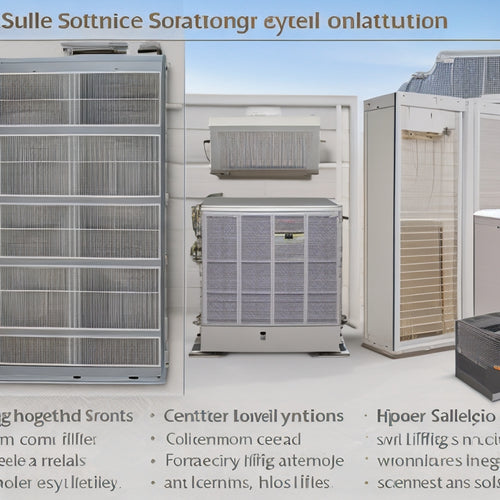
Solar Panel Kits for Eco-Friendly Fleets Online
Share
You're taking the first step towards creating an eco-friendly fleet by exploring solar panel kits online, a definitive move towards reducing your carbon footprint and operational costs. Solar panel kits can diminish your fleet's carbon footprint, reduce greenhouse gas emissions, and save you money on fuel costs and operational expenses. To get started, consider the unique energy requirements of your vehicles, confirm compatibility with your fleet's electrical systems, and evaluate energy storage capacity. As you explore your options, you'll uncover the perfect solar panel kit for your eco-friendly fleet - and discover the benefits that come with it.
Key Takeaways
• Integrating solar panel kits can diminish carbon footprint, reduce operating costs, and improve profitability for eco-friendly fleets.
• Choose a solar kit that is compatible with your fleet's energy consumption, roof space, and electrical system to ensure seamless integration.
• Consider key features such as energy efficiency, durability, and warranty when selecting a solar panel kit for your commercial fleet.
• Proper installation and maintenance of solar panels are crucial to ensure optimal energy output and extend the lifespan of the system.
• Top brands like Renogy and HQST offer high-efficiency solar panel kits designed specifically for the unique demands of commercial vehicles.
Benefits of Solar Panel Kits
Moreover, substantially integrating solar panel kits into your fleet can greatly diminish your carbon footprint and operating costs. This is particularly crucial for companies that prioritize environmental sustainability and want to reduce their environmental impact.
By harnessing renewable energy from the sun, you can notably decrease your dependence on fossil fuels, leading to a substantial reduction in greenhouse gas emissions. This, in turn, helps mitigate climate change and creates a healthier environment for everyone.
In addition, solar panel kits can help you save money on fuel costs, which can be a significant expense for fleet operators. With solar power, you can reduce your fuel consumption, leading to lower operational costs and increased profitability.
Furthermore, solar panel kits are relatively low maintenance and can last for many years, providing a reliable source of energy for your fleet. By adopting solar panel kits, you can demonstrate your commitment to environmental responsibility while also improving your bottom line.
Choosing the Right Solar Kit
When selecting a solar panel kit for your eco-friendly fleet, you'll need to take into account the specific solar power system requirements of your vehicles.
You'll want to consider that the kit you choose is compatible with your fleet's unique needs, taking into account factors like energy consumption and available roof space.
Solar Power Systems
You'll need to take into account several factors to make sure you're selecting the right solar kit for your fleet's unique energy needs. Solar power systems are designed to provide a reliable source of renewable energy, but not all kits are created equal. To guarantee you're getting the most out of your investment, consider the following key factors:
| Solar Power System Considerations | Description |
|---|---|
| Energy Storage | Consider the capacity and type of energy storage you need, whether it's for short-term backup power or long-term energy reserves. |
| Solar Farms | Assess the size and complexity of your solar farm, including the number of panels, inverters, and mounting systems required. |
| System Design | Evaluate the overall system design, including the inverter type, panel configuration, and monitoring systems to ensure top performance and safety. |
Kit Compatibility Checks
How do you verify that the solar kit you're considering is compatible with your fleet's unique energy requirements and infrastructure?
A thorough kit compatibility check is essential to guarantee seamless vehicle integration and peak performance. Start by reviewing the kit's technical specifications, paying attention to the voltage, current, and power output. Confirm these match your fleet's energy requirements to avoid any potential safety risks or system failures.
Next, assess the kit's compatibility with your fleet's existing infrastructure. Consider the type of vehicles, their electrical systems, and the available mounting space. Fleet standardization is key here, as it enables you to select a kit that can be easily installed and maintained across your entire fleet. Look for kits with flexible mounting options and adjustable angles to accommodate different vehicle types.
Key Features to Consider
When selecting a solar panel kit for your eco-friendly fleet, you'll want to take into account several key features to make sure you're getting the right system for your needs.
You'll need to verify that the kit is compatible with your vehicles' electrical systems, and evaluate the energy efficiency ratings to maximize your energy harvest.
Additionally, you should examine the durability and warranty offered by the manufacturer to guarantee a reliable and long-lasting solution.
System Compatibility Checks
Your solar panel kit's system compatibility checks should involve a thorough assessment of your fleet's electrical architecture to guarantee seamless integration. This guarantees that the solar panel kit can efficiently supply power to your vehicles without compromising their performance or safety. During the system compatibility checks, you should analyze your fleet's electrical systems, including the battery type, charging systems, and electrical loads.
| Fleet Analysis | System Integration | Compatibility Check |
|---|---|---|
| Electrical Architecture | Inverter Compatibility | Voltage and Current Ratings |
| Battery Type and Capacity | Charge Controller Integration | Electrical Load Analysis |
| Charging System Capacity | Solar Panel Array Configuration | System Grounding and Bonding |
| Vehicle Electrical Loads | Monitoring and Control Systems | Safety Feature Compatibility |
Energy Efficiency Ratings
When you guarantee smooth system integration, you'll want to evaluate the energy efficiency ratings of your solar panel kit, considering key features that maximize power output while minimizing energy losses. This involves reviewing the Energy Labels, which provide a standardized way to compare the energy efficiency of different solar panel kits. Look for labels that indicate compliance with regulatory standards, such as those set by the International Electrotechnical Commission (IEC).
You'll want to make sure that your solar panel kit meets the necessary regulatory requirements, such as compliance with UL (Underwriters Laboratories) standards in the US or IEC standards globally. This guarantees that your solar panel kit meets safety and performance standards, providing you with a reliable and efficient energy source.
Additionally, energy-efficient solar panel kits can help reduce your carbon footprint, making them an attractive option for eco-friendly fleets. By evaluating energy efficiency ratings and ensuring regulatory compliance, you can make an informed decision when selecting a solar panel kit for your fleet.
Durability and Warranty
Considering the harsh outdoor environments in which solar panel kits operate, you need to evaluate the durability and warranty features that guarantee your fleet's energy system remains reliable and maintenance-free over its lifespan.
Weather resistance is a critical aspect to assess, as solar panels are exposed to various environmental elements like rain, snow, and extreme temperatures. Look for kits with IP67 or higher ratings, ensuring your system can withstand harsh weather conditions.
When it comes to warranty, you want extended coverage that provides peace of mind. A thorough warranty should cover the solar panels, inverters, and other components for an adequate period, typically 25 years or more. This ensures you're protected against defects, material degradation, and performance issues.
Be sure to review the warranty terms, including the duration, coverage, and maintenance requirements. A reliable solar panel kit with a robust warranty will minimize downtime, reduce maintenance costs, and maximize your fleet's energy efficiency.
Solar Panel Kit Installation
You'll need to prepare your vehicle's roof or trailer top for solar panel kit installation by making sure it's clear of obstructions and securely fastening the mounting hardware. This Roof Preparation is vital to guarantee a safe and secure installation.
Make sure to clean the surface of any dirt, debris, or old adhesive residue. Next, identify the best placement for the solar panels, taking into account any vents, antennas, or other obstructions.
Once your roof is prepared, it's time for Electrical Integration. This involves connecting the solar panels to your vehicle's electrical system. You'll need to ensure the wiring is securely connected to the battery and any other electrical components. It's important to follow the manufacturer's instructions and take necessary safety precautions to avoid electrical shock or fires. If you're not comfortable with electrical work, consider consulting a professional.
Proper installation is crucial to ensure the solar panel kit functions efficiently and safely. By following these steps, you'll be on your way to harnessing the power of the sun and reducing your fleet's carbon footprint.
Top Brands for Commercial Fleets
Among the top brands for commercial fleets, companies like Renogy and HQST offer high-efficiency solar panel kits designed specifically for the unique demands of commercial vehicles. These kits are built to withstand the rigors of heavy use and provide reliable power for your fleet's needs.
When selecting a solar panel kit for your commercial fleet, consider the specific requirements of your vehicles and choose a kit that meets those needs. Look for brands that offer customizable solutions and high-quality components to guarantee peak performance.
As you explore commercial options for your fleet, consider the benefits of solar power integration. With solar panels, you can reduce your fleet's carbon footprint and lower operating costs. Effective fleet management involves making informed decisions about equipment and resources.
Cost-Effective Solar Solutions
When evaluating cost-effective solar solutions for your commercial fleet, it's important to take into account the upfront investment in relation to long-term savings and environmental benefits. You'll want to weigh the initial cost of purchasing and installing solar panels against the potential savings on fuel and maintenance.
Additionally, take into account the carbon offset benefits of switching to renewable energy, which can lead to a reduced carbon footprint and a more eco-friendly fleet.
To further offset the upfront costs, explore available renewable incentives, such as tax credits or grants, that can help reduce the financial burden. You may also be eligible for rebates or discounts from government agencies or utilities companies.
By taking advantage of these incentives, you can significantly reduce the overall cost of implementing solar solutions for your fleet.
Ultimately, the key to a cost-effective solar solution lies in finding the right balance between upfront investment and long-term benefits. By carefully evaluating your options and exploring available incentives, you can make a smart, eco-friendly choice for your commercial fleet that also makes financial sense.
Maintaining Your Solar Panels
To guarantee peak performance and extend the lifespan of your solar panels, regular maintenance is necessary to prevent dirt, debris, and environmental factors from reducing energy output. You'll want to develop a routine cleaning schedule to keep your panels in top shape.
| Maintenance Task | Frequency | Importance |
|---|---|---|
| Inspect panels for damage | Quarterly | High |
| Clean panels with water and mild soap | Monthly | Medium |
| Check electrical connections | Semiannually | High |
| Monitor performance data | Daily | High |
| Trim nearby vegetation | Annually | Medium |
Frequently Asked Questions
Can Solar Panels Be Installed on Older Fleet Vehicles?
As you consider upgrading, did you know that over 50% of fleet vehicles are over 10 years old? You can install solar panels on older fleet vehicles, but first, conduct a thorough Vehicle Inspection to guarantee a successful Fleet Renovation, securing a safe and efficient integration.
Are Solar Panels Compatible With Diesel Engines?
You'll be relieved to know that solar panels are compatible with diesel engines, as they don't interfere with engine performance or fuel efficiency, ensuring a safe and efficient integration that meets your fleet's needs.
How Long Does a Solar Panel Kit Warranty Typically Last?
When you purchase a solar panel kit, you can expect a warranty that typically lasts 25 years or more, backed by manufacturer support, meeting industry standards, with clear performance guarantees, and defined warranty limitations for your peace of mind.
Can I Customize a Solar Panel Kit for My Fleet's Needs?
You'll be interested to know that 70% of businesses personalize their solar panel kits. Yes, you can customize a kit for your fleet's needs through a thorough fleet analysis and energy audit to guarantee peak energy efficiency and safety.
Are Solar Panels Resistant to Extreme Weather Conditions?
You can rest assured that solar panels are designed to withstand extreme weather conditions, boasting impressive weather durability and climate endurance to resist environmental stress, ensuring your fleet's safety and reliability.
Related Posts
-

Why Solar HVAC Filters Revolutionize Home Energy Efficiency
By adopting solar HVAC filters, you're shifting your home's energy reliance from fossil fuels to clean, renewable sou...
-

What Does Your Home Energy Audit Report Reveal?
Your home energy audit report reveals a detailed analysis of your energy consumption patterns, highlighting areas of ...
-

Why Choose Solar Composting Toilets for Your Home?
By choosing a solar composting toilet for your home, you'll greatly reduce your environmental impact, slashing your w...


